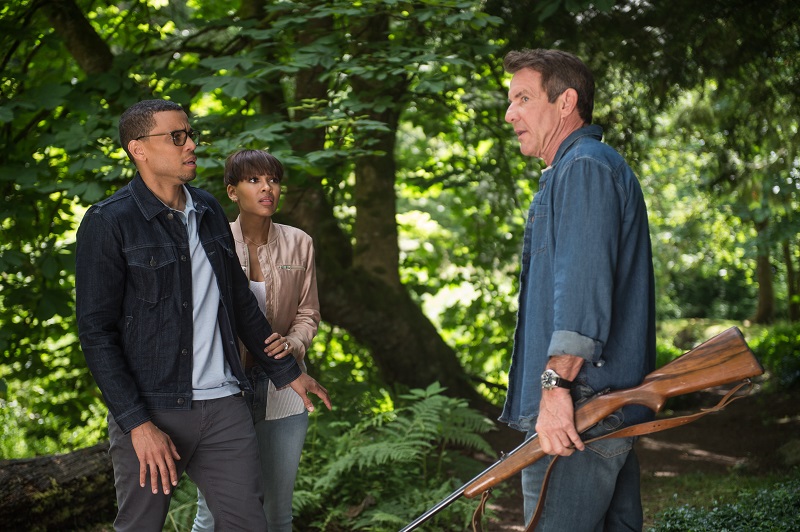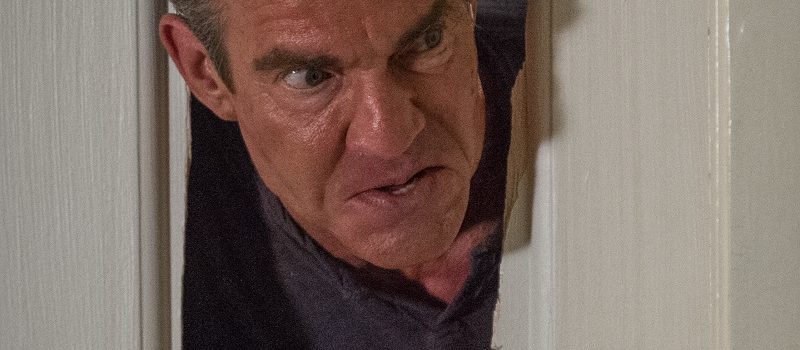In the world of film, when tackling a microgenre—such as the home invasion thriller—it is important to bring something new to the table. The Intruder does that. But is that enough to get this story of a married couple buying their first house, and all the dreams that accompany that basic tenet of the American dream, chillingly across the finish line?

Dennis Quaid stars as Charlie Peck. He’s selling his Napa Valley home to Annie and Scott Russell (Meagan “is always” Good and Michael Ealy). They’re young, successful and after doing the city thing in San Francisco they are ready to put down roots, start a family and bask in the glow of domestic bliss (in wine country no less!).
Thing is, Charlie is having trouble letting go of this abode that has been in his family for several generations. “It’s the only home I’ve ever known,” he says to his perspective buyers in a clue that should have sent them running for those vineyard-laden hills. Then again, I have the power of foresight having seen how this whole real estate transaction works out.
As laid out in David Loughery’s screenplay, the building terror is a slow burn and it does so in a manner that is somewhat believable. Usually in films that result in horrible things happening at a house, the audience is screaming at the screen to anyone who can hear to “get the heck out.” That doesn’t happen here because Loughery has laid out an outline for the home invasion thriller that indeed is unique.
This is the story of an emotionally scarred man (mentally), who literally has nothing to cling to anymore, and the crux of the tale exists in whether he possesses the ability to remove himself from these walls that are soaked with memories. Yes, it is a home invasion movie. But The Intruder is also (or at least aspires to be) a study in the side of an equation where we usually don’t pay much attention. When someone’s American dream of home ownership commences, another’s ends at the most and at the least … has to literally move on in some capacity.
There are a few too many often used tropes that hinder director Deon Taylor’s ability to take this smidge of uniqueness and exponentially expand it into something that is truly terrifying. For starters, Scott knows something is off about Charlie from the get-go. He doesn’t even want to buy the house after they first visit it, but Annie is hard to say no to when one, she has her mind set on something and two, bats her doe eyes. As the plot progresses, Scott is always the naysayer when up to these points, Charlie has given them no reason to be overly afraid. I mean, it is a little odd that the man said he was going to live with his daughter and Florida and the next day he shows up to mow the lawn.
It is a tad bizarre that he, frankly, keeps showing up when almost anything is done to the integrity of the home. Scott repeatedly tells his wife to not let Charlie in and that they need to put their foot down. She sees him as harmless, that is until he isn’t.
Audiences have seen that in the home invasion milieu. The husband, the wife, whoever for that matter, is weary and it’s discounted until it’s too late. The uniqueness of the previous home owner’s psychosis serving as the catapult to the home invasion gets diluted with each success “been there, done that” thriller trope that Loughery employs. Much of the early moments of The Intruder are neon sign type foreshadowing—which does nothing to enhance the thrills and chills you seek as a filmmaker.

There’s even the husband’s indisposed (here, Scott’s in the hospital because some psycho ran him off the road—but we don’t know for sure that it was our resident nut job) moment where he comes to the realization that wifey is in danger and has to find some way to get home and save her which ultimately leads to our classic, tried and true, final confrontation between all the parties involved. Once a few reveals are delivered (no spoilers here, people!), I have to say that its conclusion does feel as fresh as its initial idea.
Quaid is masterful and chews the scenery off in a good way. Usually that is not the best compliment to an actor. But given the backstory and onscreen reality of Charlie, the veteran actor delivers a performance that is beyond believable and above all else—spotlights a thespian having an utter blast being batsh*t bananas. Quaid has not played a villain all that much in his career. After all, he’s Mr. Dashing and dependable in so many roles where we are pulling for him because of the aura he gives off in his characterizations. In a lot of ways, that formula to the Dennis Quaid school of acting, works brilliantly for his tackling of this title character. No, of course we do not want him to succeed in his passionate petrifying of the Russells. We do, however, feel immense sadness for him—something Annie talks about throughout and firmly explains why she is always giving him a, “come on in” when she should be saying, “get the “F” out and never come back.”

Ealy and Good are terrific together, but that should hardly be a surprise. Although they weren’t coupled in Think Like a Man and Think Like a Man Too, there was an unspoken something-something one could feel whenever they were shared space in a scene.
The other thing, this entire effort does not work if Good isn’t believable in her good hearted embodiment. She mustn’t come off as gullible or worse, not so bright. Annie’s heart must be pure. As written by Loughery, and delivered by the actress, that is exactly what we glean from her character. Ealy has a role that is firmly within his wheelhouse. He plays the protective soul who can get over his head and still triumph quite well. Or course the most important aspect of both actors is how they perform together. This is a couple that the audience will firmly get behind as they are 1) just so darn cute, 2) mirror our hopes and dreams for an ideal life to build for oneself and 3) still have their moments of dispute that get ironed out in the finest of fair manners.
Where the filmfalls into trouble is when it veers away from its originality of intent. Researching the film before heading into the theater, one thing screams out. Screenwriter Loughery’s resume is highlighted by Lakeview Terrace and Obsessed. Both films are variations on the theme that is home invasion or its cinematic cousin “the off kilter soul invading one’s life.” Then, there’s director Taylor. His previous credits include last year’s home invasion misfire Traffik. Between the two of them, The Intruder should have been a lesson in what not to do with this microgenre. They do provide some thrills and yes, some chills. It is just not the hammer to the head that it could have been.
Grade: B-

